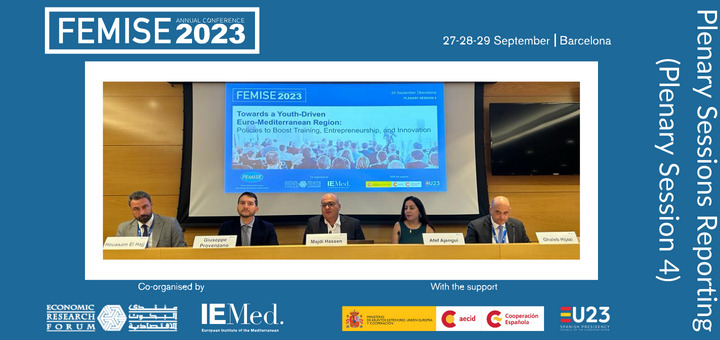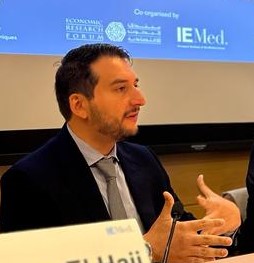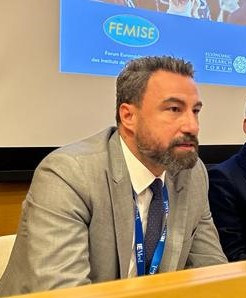Plenary Session 4 –Towards a Youth-Driven Euro-Mediterranean Region: Policies to Boost Training, Entrepreneurship, and Innovation
 The Euro-Mediterranean region is home to the youngest population in the world. While youth can be among the most vulnerable, they are also the most creative and innovative and they aspire for a better future for their region. They deserve to be the main beneficiaries of a deepened regional integration with better education, job, and mobility opportunities. Unleashing the potential of the Mediterranean youth can only be achieved by providing them with the needed support in terms of training, access to finance, as well as the tools and knowledge to develop their entrepreneurship activities in innovative and sustainable sectors.
The Euro-Mediterranean region is home to the youngest population in the world. While youth can be among the most vulnerable, they are also the most creative and innovative and they aspire for a better future for their region. They deserve to be the main beneficiaries of a deepened regional integration with better education, job, and mobility opportunities. Unleashing the potential of the Mediterranean youth can only be achieved by providing them with the needed support in terms of training, access to finance, as well as the tools and knowledge to develop their entrepreneurship activities in innovative and sustainable sectors.
Chair
- Majdi Hassen, Executive Director, The Arab Institute of Business Leaders (IACE), states that public policies in southern Mediterranean countries should involve young people and be oriented to stimulate training, entrepreneurship and innovation..
Speakers
- Giuseppe Provenzano, Project Manager, Higher Education and Research Division at the Union for the Mediterranean (UfM), asks this question: how can Mediterranean youth be empowered with the knowledge and skills necessary to access labor markets and achieve the green transition? The region has a young and growing population which constitutes an under-utilized asset.
 As Mr. Giuseppe states, in the Euro-Mediterranean region, we have more than 30 million university students. It is also predicted that, by 2030, we will see enrolment rates at universities, higher education institutions and research centers increase by 40%. Young people hold the key to the future and are the leaders of tomorrow. However, they do not have all the necessary tools to change their countries, create new economies and open new startups. This is why it is necessary to further link education to the labor market in order to provide them with the skills they need, adopting the triple or quadruple helix model of innovation, in which all actors, namely government, academia, civil society, and the private sector are involved, can provide a structural approach to resolve the unemployment problem and update study programs for the green transition.
As Mr. Giuseppe states, in the Euro-Mediterranean region, we have more than 30 million university students. It is also predicted that, by 2030, we will see enrolment rates at universities, higher education institutions and research centers increase by 40%. Young people hold the key to the future and are the leaders of tomorrow. However, they do not have all the necessary tools to change their countries, create new economies and open new startups. This is why it is necessary to further link education to the labor market in order to provide them with the skills they need, adopting the triple or quadruple helix model of innovation, in which all actors, namely government, academia, civil society, and the private sector are involved, can provide a structural approach to resolve the unemployment problem and update study programs for the green transition.
- Afef Ajengui, Senior Program Manager at the Tunisia Foundation for Development, states that the Mediterranean region has the highest unemployment rate in the world at over 29% and the MENA region has the highest unemployment rate for 25 years.
 In Tunisia, 30% of higher education graduates are unemployed due to two main factors: an economic model that has failed to generate the skilled jobs needed for a balanced labor market and the mismatch between qualifications of graduates and the needs of businesses. Many countries in the region are now focusing on developing more and more entrepreneurial ecosystems within their strategies and within their communities. Innovative sectors are essential to foster economic growth and sustainability. As Afef points out, it is important to better promote youth entrepreneurship through education and training while providing them with the necessary financial assistance, to facilitate the implementation of accelerators and incubators in the green sector and to advocate in favor of policies that ease the regulatory burden on startups and simplify business registration. It is also necessary to encourage public-private partnerships to create joint initiatives that support youth entrepreneurship and promote success stories.
In Tunisia, 30% of higher education graduates are unemployed due to two main factors: an economic model that has failed to generate the skilled jobs needed for a balanced labor market and the mismatch between qualifications of graduates and the needs of businesses. Many countries in the region are now focusing on developing more and more entrepreneurial ecosystems within their strategies and within their communities. Innovative sectors are essential to foster economic growth and sustainability. As Afef points out, it is important to better promote youth entrepreneurship through education and training while providing them with the necessary financial assistance, to facilitate the implementation of accelerators and incubators in the green sector and to advocate in favor of policies that ease the regulatory burden on startups and simplify business registration. It is also necessary to encourage public-private partnerships to create joint initiatives that support youth entrepreneurship and promote success stories.
- Houssam El Hajj, Instructor at the General Directorate of Vocational Education and Training in Lebanon,
 states that the Euro-Mediterranean region has immense potential for growth and development and it is essential to fully exploit this potential by empowering young people who constitute a significant part of the population. There is a big social stigma that technical and vocational education is normal for those who fail in the regular education. However, some people are more technically qualified than academically. Most vocational or technical education graduates are competent, qualified and find employment more easily. Our role is to give them adequate education and training that truly meets the needs of the market. It is essential to promote cross-border collaboration to support young people and empower women and minorities to combat social stigma.
states that the Euro-Mediterranean region has immense potential for growth and development and it is essential to fully exploit this potential by empowering young people who constitute a significant part of the population. There is a big social stigma that technical and vocational education is normal for those who fail in the regular education. However, some people are more technically qualified than academically. Most vocational or technical education graduates are competent, qualified and find employment more easily. Our role is to give them adequate education and training that truly meets the needs of the market. It is essential to promote cross-border collaboration to support young people and empower women and minorities to combat social stigma.
- Ghaleb Hijazi, General manager at Business Development Center, states that Jordan has taken great steps in promoting entrepreneurship by launching the Economic Modernization Vision
 whose most important drivers are entrepreneurship and innovation with a focus on digitalization. As Mr. Ghaleb points out, there is a need to bridge the gap between the education system and market needs by building the capacity of young entrepreneurs, including women, who want to start their own businesses. It is also necessary to strengthen policies such as the National Youth Policy in Jordan by improving and developing a good network between young entrepreneurs in Jordan and from different countries.
whose most important drivers are entrepreneurship and innovation with a focus on digitalization. As Mr. Ghaleb points out, there is a need to bridge the gap between the education system and market needs by building the capacity of young entrepreneurs, including women, who want to start their own businesses. It is also necessary to strengthen policies such as the National Youth Policy in Jordan by improving and developing a good network between young entrepreneurs in Jordan and from different countries.
Watch the full session :


